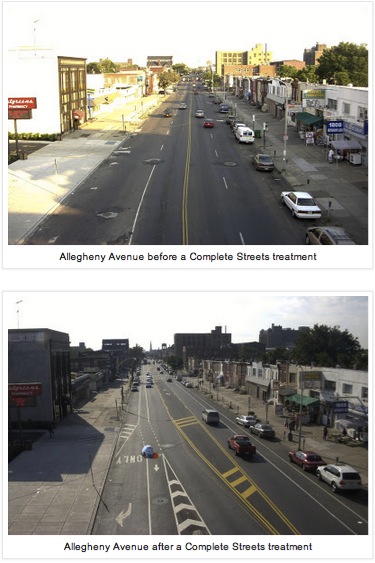Big congrats to the Greater Philadelphia Bicycle Coalition, which had a “pretty cool success” Thursday, in the words of Policy Director Sarah Clark Stuart. The entire Streets and Services Committee of the City Council voted to approve a complete streets bill, advancing what could be one of the strongest municipal complete streets policies in the nation.

The bill requires both public and private entities to consider all users when resurfacing or renovating a street or sidewalk. That should bring safer street design and better amenities for people who get around by walking, biking, or riding transit.
These seemingly dry, technical changes to traffic and zoning codes will make Philly’s streets safer for everyone, the Bike Coalition says. The bill has the support of Mayor Michael Nutter, whose top transportation official testified in support of the bill.
"Philadelphians walk, bike and take transit to work more than almost any other city in America," said Deputy Mayor for Transportation and Utilities Rina Cutler. "An important step in making our streets safe for all travelers is to modernize the code to reflect the changing needs of our city.”
Recommended street treatments and designs -- including everything from sidewalk bulb-outs to covered bus shelters to bike corrals -- will be included in a "Complete Streets Handbook" [PDF] that combines the recommendations of a slew of different city plans and reports. Before, those ideas did not have the weight of law behind them. With this bill, they'll be part of Philadelphia code.
"They wanted to be able to have legal authority to say that the handbook needed to be reviewed," Stuart said. "The thinking of the Streets Department and the Mayor’s Office of Transportation was that by authorizing handbook and having language in there that all projects must be reviewed by it, that that was what was going to drive everyone to consider it as much as possible."
What makes this complete streets bill uniquely enforceable, said Stuart, is that projects will be held up against a checklist to determine whether they are making the maximum possible accommodations to all users.
A draft version of the checklist [PDF] asks, among other things, whether the project minimizes vehicle intrusions into the pedestrian zone; connects to local bicycle, trail and transit networks; includes bicycle parking; minimizes street crossing distance and maximizes street crossing time.
The full checklist includes a comprehensive set of further questions all planners and developers should ask themselves when they begin to make changes to the built environment.
The checklist has to be attached to all street designs submitted to the city, showing that developers and planners gave "full consideration to accommodation of the safety and convenience of all users of the transportation system." If project sponsors fail to provide certain accommodations, they have to explain why. Checklists will be reviewed by the Streets Department or the Licensing and Inspections Department.
Separately, the bill contains a number of traffic enforcement measures, making it illegal to park in a bike lane and to door cyclists. Dooring was already against state law, but the city was way behind.
The Bicycle Coalition had to take some lumps to get the bill through the committee though. In particular, church parking will be allowed in some key downtown bike lanes on Sundays, a constant source of annoyance to the city’s cyclists.
Some other “dry” but important traffic rule changes in the bill include the elimination of laws requiring cyclists to ride single-file and requiring them to ride in a bike lane if one is available.
The bill is an especially rewarding victory for the Bicycle Coalition because it comes on the heels of three contentious rounds with the Council over bicycle regulations. In 2009, advocates had to beat back a push for bicycle licensing, and last summer, a bill was introduced that would have required an ordinance for every bike lane built in the city. That bill was put on hold but then brought up again. The Coalition managed to limit the bill to only lanes that replaced a parking lane or travel lane.
After those, more adversarial, experiences, "This one, I hope, is the beginning of a new relationship, and the development of a champion in [Councilman Mark] Squilla," said Stuart. It doesn't hurt that their new champion is also the chair of the Streets and Services Committee.
Though no exact date has been set, the full City Council is expected to consider the bill in early December -- and to pass it unanimously.





